
The United Nations recognises sport as being a “key enabler of sustainable development” and, through sustainable global events, sports organisations can deliver on several objectives that align with the UN Sustainable Development Goals. Since the International Basketball Federation (FIBA) became a signatory of the UN Sports for Climate Action Framework (S4CA) in 2020, it has been systematically integrating sustainability throughout its organisation and events.







As an Olympic International Federation, the Fédération Internationale de Hockey (FIH) is following the UN and the IOC’s leadership in recognising sport as an important enabler of sustainable development and peace.
As part of its Corporate Responsibility and good governance, FIH has released a new Sustainability Strategy in 2022, with the aim of encouraging the global hockey community to contribute positively to the FIH’s development goals.










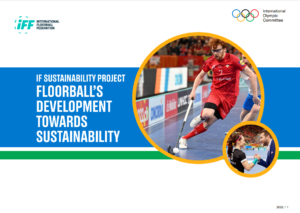
Floorball’s development towards sustainability
The general concerns around climate change and the desire to take responsibility have sparked stronger development of sustainability initiatives within floorball, and resulted in the International Floorball Federation (IFF) signing the UN Sports for Climate Action Framework (S4CA) in 2019. That same year, the IFF started preparing its Strategy for 2021-2032 – “Strengthening the Foundations” – which includes sustainability as one of the main focus areas.








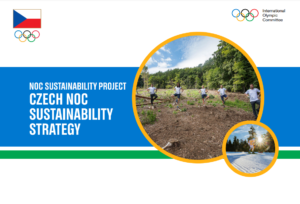
The Czech Olympic Committee (COC) has released its
new Sustainability Strategy as one of the outcomes of its
participation as a mentee in the As Sustainable As Possible
(ASAP) project. The Strategy was inspired by the IOC’s
sustainability guidelines and best practices from the mentor
NOCs: Germany, Finland and Denmark.













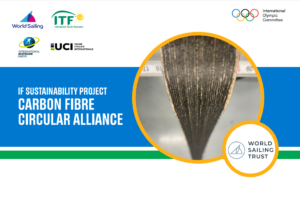
The forward-looking Carbon Fibre Circular Demonstration Project (Carbon Fibre Project) is a multi-sport collaboration that aims to work with sports equipment manufacturers and users on how to recover, transform and reuse carbon fibre from sporting goods components.
It is coordinated and managed by the World Sailing Trust (The Trust), the charitable organisation affiliated to World Sailing.








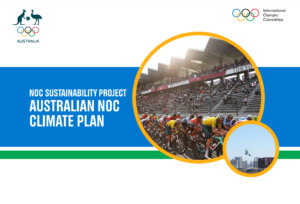
The Australian Olympic Committee (AOC) became a signatory to the UN Sports for Climate Action Framework in 2020, committing to reducing its emissions by 50% by 2030 and achieving net zero emissions by 2040.
In 2021, as it embarked on its sustainability journey, the AOC started its “Stage One – Establish a Baseline” project to help build its carbon baseline report and organisational readiness to move towards a more comprehensive climate strategy. On the one hand, it measured its 2019 baseline emissions and its 2020 emissions performance, identifying key opportunities for improvement.
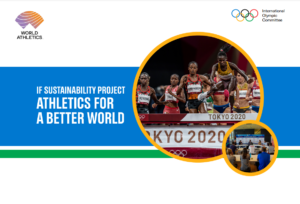
World Athletics’ vision is to use the power and accessibility of athletics and its athletes to create a healthier and fitter world.
This sustainability vision is guided by the Athletics for a Better World (ABW) programme, which harnesses the commitment and energy of the worldwide athletics family to inspire lasting change across all segments of the sport and the society that embraces it. Propelled by the UN’s Sustainable Development Goals and united under a common brand, the ABW platform promotes all World Athletics projects that seek to use athletics as a tool for social, economic and environmental good.













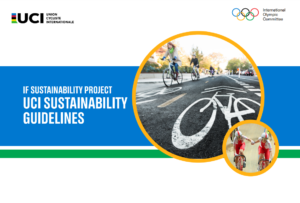
As part of its commitment to uphold the five principles of the UN Sports for Climate Action Framework, the Union Cycliste Internationale (UCI) is aiming to make cycling one of the most sustainable sports in the world by increasing the positive environmental, social and economic impacts of its operations and activities.
As part of its strategy, the UCI published its Sustainability Guidelines to provide simple, practical and essential information on key aspects of sustainability for the sport of cycling.













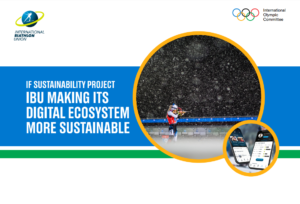
As part of its commitment to the goals of the UN Sports for Climate Action Framework and the Race to Zero campaign, the International Biathlon Union (IBU) aims to reduce the carbon footprint of biathlon by 50% by 2030 and become net zero by 2040. Managing a sport’s carbon footprint requires measurements on various levels.
In an increasingly digital world, the carbon footprint of digital services is not insignificant but it is poorly understood. There is little information available about the environmental impact of technology and digital services in general, and sport is no exception.



The International Hockey Federation (FIH) established planet and prosperity as two of the pillars of its Sustainability Strategy. These pillars set priorities to ensure the future of hockey through continuous sustainable innovation, which can generate more income and thus the growth of the sport. A ground-breaking initiative in this regard is “Big Stadium” Hockey: temporarily transforming existing venues normally used for other sports into hockey venues for international matches. In hockey, permanent artificial turf installation has typically been required to achieve the high-performance standards of elite-level competition, for example, ensuring that the surface is perfectly flat so that the ball runs true across it. However, the new capability to temporarily install artificial turf that is up to the required standards, and in just three days, has become a game-changing opportunity for the sport.




